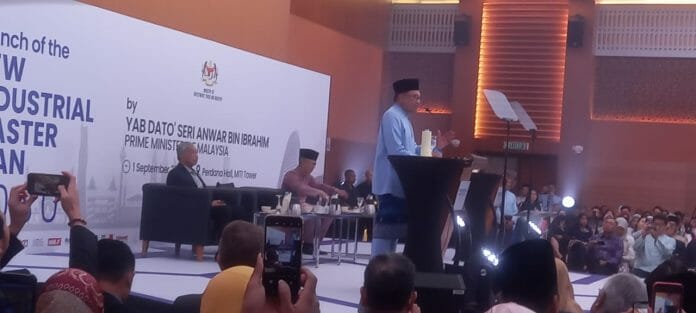The New Industrial Master Plan 2030 (NIMP 2030) was launched by the Prime Minister Dato’ Seri Anwar Ibrahim at the Ministry of Investment, Trade & Industry (MITI).
The NIMP 2030 is the fourth edition of the Industrial Master Plan (IMP). Its markedly different mission-based approach compared to earlier IMPs is set to transform Malaysia’s manufacturing sector by ensuring broad-based growth, in alignment with the MADANI Economy’s vision and objectives.
Through strategies such as increasing economic complexity, strengthening domestic industrial linkages, and positioning Malaysian industries higher in the global value chain, NIMP 2030 targets to build Malaysia’s industrial capacity and resilience for long-term, sustainable growth
“The manufacturing sector stands as a pivotal force to propel Malaysia’s economic growth and development, being a significant contributor to the nation’s GDP, providing employment for 2.7 million individuals. We must seize the opportunity to expand our base as Malaysia is now well-positioned to capitalise on three key global trends,” said Anwar.
Firstly, the global geopolitical situation has driven companies to turn to SouthEast Asia as the “Plus One” destination to ensure economic security and supply chain resilience. This unlocks opportunities for Malaysia to further integrate into the Global Value Chain.
According to Anwar, the nation can leverage on its mature industrial infrastructure with good connectivity, strategic location and reputation as one of the top destinations for innovation and doing business.
Secondly, Malaysia needs to accelerate their digitalisation efforts to stay ahead in the post-pandemic era as well as step up efforts to develop high-skilled talent and enhance TVET programmes.
“These initiatives will empower the Malaysian workforce to enhance efficiency and accelerate innovative capability, thereby creating a larger pool of skilled human capital for the nation. Thirdly, in facing the challenges of climate change, we need to adopt sustainable practices especially in ESG-sensitive markets to create new growth opportunities in green manufacturing, electric vehicles, and carbon capture, utilisation and storage (CCUS),” he said.
Minister of Investment, Trade and Industry Tengku Datuk Seri Utama Zafrul Aziz said, “The manufacturing sector serves as a key engine of growth to drive the nation’s next phase of economic expansion. As such, we need an industrial masterplan that would shape a more robust manufacturing sector to generate broad-based benefits for multiple stakeholders in the country. Our goals include enhancing SMEs’ competitiveness to enable them to integrate into global supply chains. Equally important is the Rakyat, whom we aim to provide with higher-paying and better-quality jobs. Through this industrial transformation, we are committed to rebuild our middle-class, ensuring that key stakeholders can also thrive in our prosperous future.”
NIMP 2030 aims to deliver an accelerated and holistic broad-based growth for the nation through six key goals, which are to increase economic complexity, create high-value job opportunities, extend domestic linkages, develop new and existing clusters, improve inclusivity, and enhance ESG practices.
Target impactful outcomes include diversification of the economy, improved global competitiveness through more complex products for export, and higher wages for manufacturing sector employees.
Through its Mission-based Approach, the NIMP 2030 has identified four key Missions:
Mission 1: Advance economic complexity
Mission 2: Tech up for a digitally vibrant nation
Mission 3: Push for Net Zero
Mission 4: Safeguard economic security and inclusivity
These Missions will be supported by four Enablers to achieve the NIMP 2030 Goals:
Enabler 1: Mobilise financing ecosystem
Enabler 2: Foster talent development and attraction
Enabler 3: Strengthen best-in-class investor journey for ease of doing business
Enabler 4: Introduce whole-of-nation governance framework
Nine Mission-based Projects (MBPs) have been identified as catalytic projects to create the initial momentum of the masterplan’s implementation. The MBP champions were rigorously selected to ensure they have the stature to rally the whole industry, and the necessary capacity to scale up to create impactful spillovers, particularly via the inclusion of SMEs.
MITI will work closely with the industry to identify more MBPs throughout the NIMP’s implementation phase. SMEs have a significant role, acting as key suppliers of local content, providing value in supply chains and contributing to overall industrial development.
The NIMP 2030 will develop SMEs by, among others, building their capacity to participate in higher value-added opportunities, as well as technology adoption to increase productivity and reduce reliance on low-skilled labour.
The NIMP 2030 will also build SMEs’ ESG capacity to help secure their continued participation in ESG-compliant MNC vendor ecosystems, and continued access to ESG-sensitive export markets, while also contributing towards the country’s sustainability goals.
The NIMP 2030 will be implemented through a whole-of-nation approach with a comprehensive governance structure and monitoring mechanism.
“Our SMEs in manufacturing currently contribute only 8% to GDP and 9% to exports. There is a lot of potential to grow our SMEs in manufacturing, in line with our Ekonomi MADANI aspiration to strengthen firms of all sizes,” said Anwar.
The NIMP 2030 has, for example, specific action plans to build SMEs’ capacities to enable them to be positioned higher in global value chains. This, in turn, will help them scale up into mid-tier companies that could help Malaysia earn more foreign exchange earnings.
“Further, I understand that MITI also has a framework that will be launched in a few weeks’ time to build SMEs’ ESG capacity. This is important to ensure SMEs’ continued participation in ESG-compliant MNC vendor ecosystems, and continued access to ESG-sensitive export markets,” Anwar said.
To meet industry’s demands, we will implement a progressive wage system that promotes skill development and career advancement. Public-private collaborations will be enhanced in TVET and STEM programmes, ensuring the acquisition of skills required by the industry.
“The government is confident that the strategies in the NIMP 2030 will yield meaningful outcomes and produce big impact to the national economy. Specifically, the NIMP 2030 aims to increase the Manufacturing’s value-added to RM587.5 billion by 2030, growing by 6.5% from what it is today. This indicates an increase of 61%, derived by NIMP 2030 interventions for high-impact sectors – E&E, Chemical, EV, Aerospace, Pharmaceutical and Advanced Materials, such as Minerals and Metal,” said Anwar.
In terms of employment, a projected growth at 2.3% from 2023 is expected, providing livelihood for 3.3 million persons by 2030.
According to Anwar, the industry’s growing employment trajectory is due to the creation of high-skilled jobs as the country advances towards higher value-added activities and improvement in automation and technological advancements.
“What is most important is the projection that through NIMP’s interventions, the median salary for the Manufacturing sector is expected to grow by 9.6%, to reach RM4,510 from RM1,976, which is below the national average despite the sector’s dominant role in the national GDP. This 128% increase from 2021 is driven by the shift of the industry towards higher value added activities and high-skilled jobs opportunities created,” he said.
The Prime Minister himself will be chairing the National NIMP 2030 Council, comprising representatives from other Ministries, the industry and other agencies, to ensure the masterplan’s successful nationwide implementation. A dedicated Delivery Management Unit (DMU) will be established in MITI to monitor the progress of NIMP 2030.
The government will allocate a total of RM8.2 billion to fund the NIMP 2030 action plans throughout its implementation period. To that end, two new funds will be set up, namely the NIMP Industrial Development Fund and the NIMP Strategic Co-Investment Fund.
The implementation of the NIMP 2030 will require an estimated total investment of RM95 billion through its seven years, predominantly from the private sector mobilised from private equity, capital and financial markets.
Close to 10% will be allocated by the government to help catalyse and incentivise these investments via the NIMP Industrial Development Fund and the NIMP Strategic Co-investment Fund. Other incentives will be announced during the tabling of Budget 2024.









